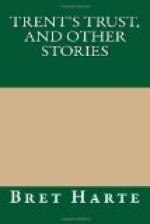It was the only allusion to that interruption and its consequences, for during the breakfast the colonel said nothing in regard to his ward, and the other guests were discreetly reticent. But Mr. Hamlin was not satisfied. He managed to get the colonel’s servant, Jim, aside, and extracted from the negro that Colonel Starbottle had taken the child that night to Pyecroft’s; that he had had a long interview with Pyecroft; had written letters and “walked de flo’” all night; that he (Jim) was glad the child was gone!
“Why?” asked Hamlin, with affected carelessness.
“She was just makin’ de kernel like any o’ de low-down No’th’n folks—keerful, and stingy, and mighty ‘fraid o’ de opinions o’ de biggety people. And fo’ what? Jess to strut round wid dat child like he was her ’spectable go to meeting fader!”
“And was the child sorry to leave him?” asked Hamlin.
“Wull—no, sah. De mighty curos thing, Marse Jack, about the gals—big and little—is dey just use de kernel—dat’s all! Dey just use de ole man like a pole to bring down deir persimmons—see?”
But Mr. Hamlin did not smile.
Later it was known that Colonel Starbottle had resigned his guardianship with the consent of the court. Whether he ever again saw his late ward was not known, nor if he remained loyal to his memories of her.
Readers of these chronicles may, however, remember that years after, when the colonel married the widow of a certain Mr. Tretherick, both in his courtship and his short married life he was singularly indifferent to the childish graces of Carrie Tretherick, her beloved little daughter, and that his obtuseness in that respect provoked the widow’s ire.
PROSPER’S “OLD MOTHER”
“It’s all very well,” said Joe Wynbrook, “for us to be sittin’ here, slingin’ lies easy and comfortable, with the wind whistlin’ in the pines outside, and the rain just liftin’ the ditches to fill our sluice boxes with gold ez we’re smokin’ and waitin’, but I tell you what, boys—it ain’t home! No, sir, it ain’t home!”
The speaker paused, glanced around the bright, comfortable barroom, the shining array of glasses beyond, and the circle of complacent faces fronting the stove, on which his own boots were cheerfully steaming, lifted a glass of whiskey from the floor under his chair, and in spite of his deprecating remark, took a long draught of the spirits with every symptom of satisfaction.
“If ye mean,” returned Cyrus Brewster, “that it ain’t the old farmhouse of our boyhood, ’way back in the woods, I’ll agree with you; but ye’ll just remember that there wasn’t any gold placers lying round on the medder on that farm. Not much! Ef thar had been, we wouldn’t have left it.”
“I don’t mean that,” said Joe Wynbrook, settling himself comfortably back in his chair; “it’s the family hearth I’m talkin’ of. The soothin’ influence, ye know—the tidiness of the women folks.”




